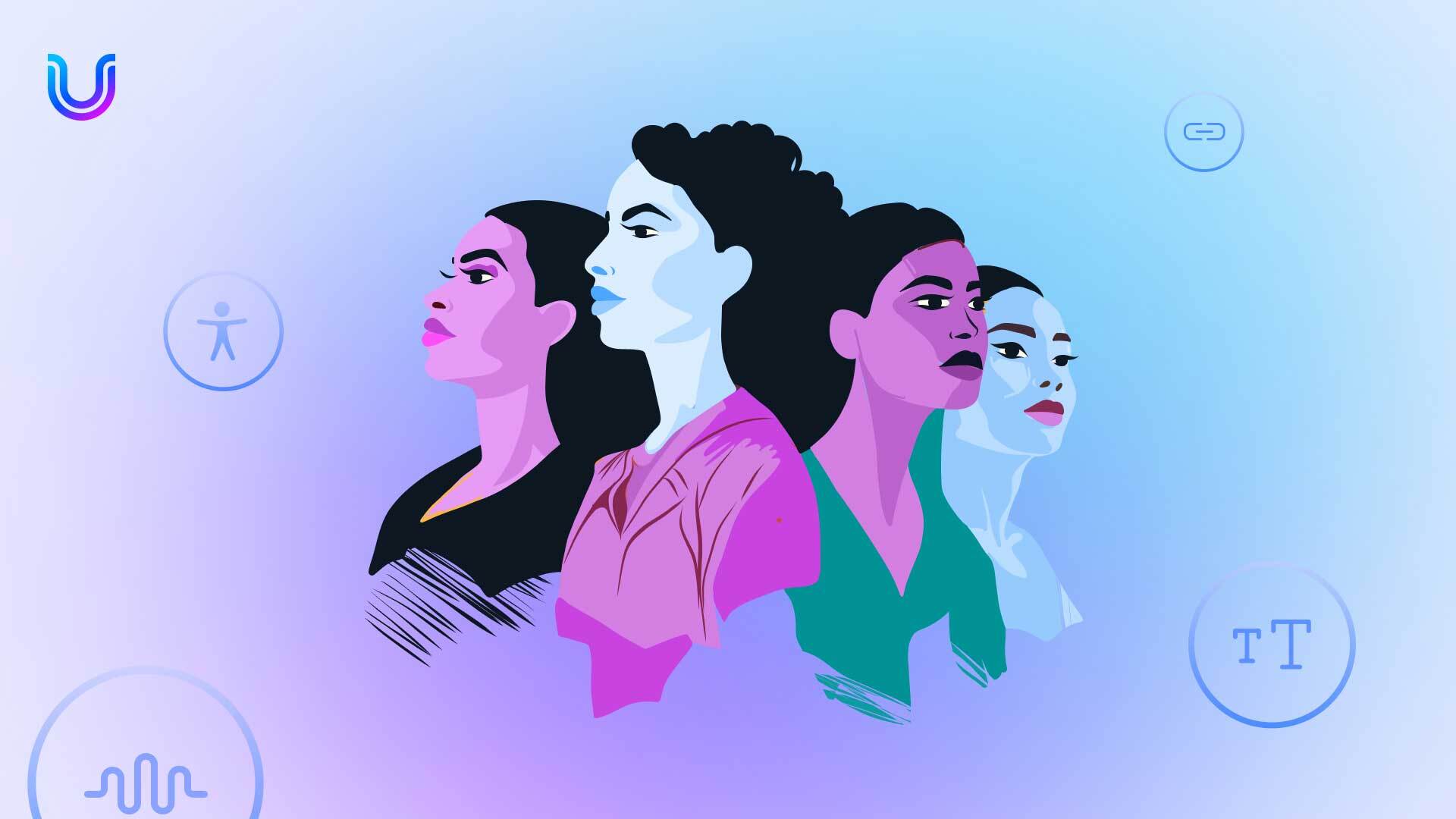Women’s History Month: honoring accessibility trailblazers & inspirational figures

March is a time for celebrating, reflecting, and recognizing Women’s History Month. This annual observance honors the contributions and achievements of women throughout history and reminds us of their pivotal role in shaping societies, cultures, and nations worldwide.
However, one aspect that often goes unnoticed is the significant role women have played and continue to play in digital accessibility. As we celebrate these pioneers who have positively changed our world, we also reflect on creating a more inclusive and equitable future.
Let’s discuss the origins of this annual event, women in history, and current pioneers who impact digital accessibility and future generations. We also list local 2024 events you can attend.
When and how did Women’s History Month start?
It was 1978 when Women’s History Month started as a local celebration in Santa Rosa, California. Stakeholders selected the week of March 8 to coincide with International Women’s Day. The cause soon caught fire nationally, with other communities initiating Women’s History Week celebrations.
An alliance of women’s groups and historians, spearheaded by the National Women’s History Project, lobbied for nationwide acknowledgment In 1980. As a result, President Jimmy Carter established National Women’s History Week in February of that same year. Congress passed Pub. L. 100-9 in 1987, officially establishing the celebration as Women’s History Month.
Who are some noteworthy women who advocate digital accessibility?
National Women’s History Month is an opportunity to learn the stories of history’s most inspirational women, highlighting their accomplishments, resilience, and determination to break barriers and advocate for change. These influential women helped change the course of history in numerous ways, including their efforts to make the digital landscape a more inclusive space for all.
Here, we celebrate five remarkable women who have made the digital world more accessible:
-
Judy Brewer
Brewer is a pioneer in the field of web accessibility. From 1997 to 2023, she was director of the Web Accessibility Initiative (WAI) at the World Wide Web Consortium (W3C). She has worked tirelessly to develop guidelines and standards for web accessibility, which have been instrumental in ensuring that websites and digital content design are more digitally accessible.
-
Chieko Asakawa
Chieko Asakawa has committed decades of her life to making the world more accessible. In her early career as a computer scientist, she was instrumental in developing breakthrough assistive technology. These efforts include her invention of the game-changing web-to-speech system, the IBM Home Page Reader (HPR), in 1997. Her recent work includes researching ways AI can help people with disabilities live more independently.
-
Sheryl Burgstahler
Burgstahler is the founder and director of Accessible Technology Services at the University of Washington. Through her work, she has been a driving force in promoting accessibility in education and technology. Burgstahler’s initiatives have led to the development of innovative tools and resources to support students and professionals with disabilities in accessing digital information and technology.
-
Jenny Lay-Flurrie
Lay-Flurrie joined Microsoft in 2005 to work on Hotmail and Bing. However, her passion for advocating accessibility inspired the creation of Microsoft’s Disability Employee Resource Group and her current role as the tech giant’s Chief Accessibility Officer. Jenny has spearheaded the company’s approach to accessibility since 2016, facilitating accountability and a disability-inclusive culture. Jenny actively uses LinkedIn and Twitter to support her ongoing efforts.
-
Henny Swan
Swan is a well-known accessibility advocate and consultant who has worked with organizations such as The Paciello Group and The BBC. She’s a vocal proponent of inclusive design practices and has played a vital role in raising awareness about the importance of digital accessibility within the tech industry. Swan’s expertise and advocacy have inspired countless individuals and companies to prioritize accessibility in their digital products and services. Swan leverages Linkedin to advance her accessibility advocacy.
How do women in history impact the future?
Women’s History Month amplifies women’s voices and highlights their remarkable past achievements. Whether leading grassroots movements, breaking new ground in STEM fields, or advocating for social justice, they embody this annual celebration’s resilience and determination. But it’s also a chance to honor the accomplishments of contemporary women advancing the cause of digital accessibility.
Beyond individual achievements, women have played a vital role in shaping social movements and driving progress on a global scale. Suffragists battled for women’s voting rights, present-day activists continue advocating for gender equality, and numerous women have dedicated their lives to advancing digital accessibility. On an organizational level, various non-profits in the U.S. also empower women to reach their full potential. Likewise, organizations like Girls Who Code, Girl Up, Girls on the Run, WriteGirl, She Should Run, and She’s the First inspire and equip younger generations to find their path to success and happiness.
Most importantly, Women’s History Month can enlighten future generations to recognize the importance of gender equality and continued progress in all aspects of life. These efforts include their impacts on digital accessibility, which helps ensure everyone can access and use digital platforms, websites, and technology regardless of their abilities. Only by passing the torch can this movement thrive and strengthen as society evolves.
How can you celebrate locally? See the event listing below.
Women’s History Month: 2024 theme and events
The 2024 theme recognizes “Women Who Advocate for Equity, Diversity and Inclusion.” It showcases women who strive to eradicate bias and discrimination on an individual and institutional level.
Here are some upcoming 2024 events:
- Mar 22: Foundation: A Women’s History Month Event
Littlefield, Brooklyn, New York
- March 23: The Chili Queens & the Invention of Tex-Mex
LA Plaza Cocina, Los Angeles, California
- March 23: Women’s History Month Celebration
400 Cameron Street, Alexandria, Virginia
- March 23: Celebrating Women and Music
African American History and Culture Museum, Washington D.C.
- March 25: Seven Sisters Women’s History Edit-a-thon
Bryn Mawr College, Lower Merion Township, Pennsylvania
- March 27: Wikipedia: Meetup/Women in Science Edit-a-thon
University of Oklahoma
- March 27: Becoming Visible Wikipedia edit-a-thon
Smithsonian Institute, Washington D.C.
- March 27: Celebrating Women in Business: Panel & Pop-up
Women’s Building, San Francisco, California
- March 28: Work Life Integration and Putting Yourself First
Talent Acquisition @ Eventbrite
- March 30: Women Artists New to the National Gallery
National Gallery of Art, Washington D.C.
The movement can never stop
Women’s History Month celebrates women’s historical contributions, achievements, and resilience. It reminds us of our progress and the tireless battle for gender equality in the physical and digital worlds. But the fight is far from over. Despite significant advancements, women still face systemic barriers and inequalities in various aspects of life, including the workplace, politics, and education.
Women of color, in particular, continue to face intersecting forms of discrimination that compound their challenges and limit their opportunities to advance.
In honoring women‘s achievements in history, it’s also critical to acknowledge these ongoing struggles and inequalities. Like democracy itself, achieving and sustaining individual freedoms is never guaranteed, and Women’s History Month reminds us we can never stop pushing for a more equitable society.
UserWay: Championing inclusivity in the digital world
Women’s History Month sets an example we can all learn from, and UserWay follows that example through digital accessibility. Learn how UserWay’s AI-powered technology, attorney-driven legal support, and enterprise solutions can make your digital assets more inclusive for all people.
Commit to accessibility today.
Answers to Common FAQS
Why do we celebrate Women’s History Month?
It showcases women’s past and present accomplishments and how they’ve changed the course of history for the U.S. and the world.
What are the main themes of Women’s History Month?
Women’s History Month is an ongoing discussion about women and their contributions through various nationwide events. It also inspires people to learn about women’s noteworthy accomplishments every day.
What do Women’s History Month colors symbolize?
Purple, green, and white are rooted in England’s suffrage in the early 1900s. The Women’s Suffrage and Political Union (WSPU) used these colors and introduced them to the U.S.




Share